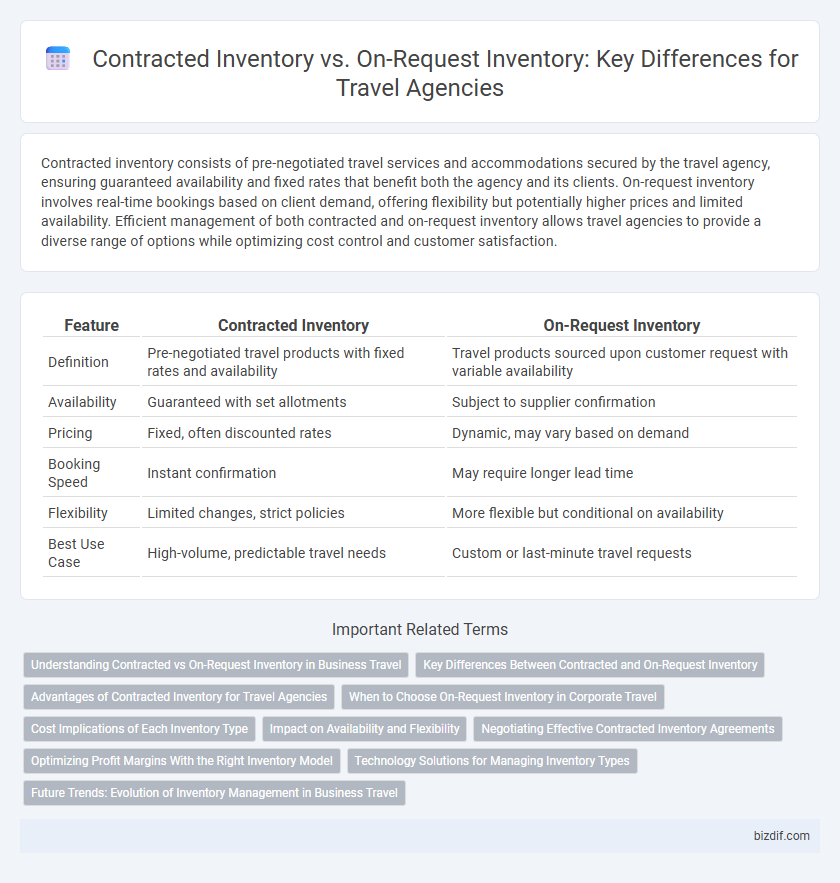Contracted inventory consists of pre-negotiated travel services and accommodations secured by the travel agency, ensuring guaranteed availability and fixed rates that benefit both the agency and its clients. On-request inventory involves real-time bookings based on client demand, offering flexibility but potentially higher prices and limited availability. Efficient management of both contracted and on-request inventory allows travel agencies to provide a diverse range of options while optimizing cost control and customer satisfaction.
Table of Comparison
| Feature | Contracted Inventory | On-Request Inventory |
|---|---|---|
| Definition | Pre-negotiated travel products with fixed rates and availability | Travel products sourced upon customer request with variable availability |
| Availability | Guaranteed with set allotments | Subject to supplier confirmation |
| Pricing | Fixed, often discounted rates | Dynamic, may vary based on demand |
| Booking Speed | Instant confirmation | May require longer lead time |
| Flexibility | Limited changes, strict policies | More flexible but conditional on availability |
| Best Use Case | High-volume, predictable travel needs | Custom or last-minute travel requests |
Understanding Contracted vs On-Request Inventory in Business Travel
Contracted inventory in business travel refers to pre-negotiated rates and guaranteed availability with suppliers, ensuring consistent pricing and immediate booking confirmation for corporate clients. On-request inventory involves searching for available options with suppliers at the time of booking, which may offer greater flexibility but often requires longer confirmation times and variable pricing. Understanding the trade-offs between contracted and on-request inventory helps travel managers optimize cost control and booking efficiency for corporate travel programs.
Key Differences Between Contracted and On-Request Inventory
Contracted inventory consists of pre-negotiated, fixed-rate accommodations or services that guarantee availability and stable prices, ensuring reliability for travel agencies and their clients. On-request inventory operates on a real-time booking basis without prior agreements, often resulting in variable pricing and limited availability depending on supplier confirmation. The key differences lie in the level of booking certainty, pricing stability, and inventory control, with contracted inventory offering more predictability while on-request inventory provides access to a broader range of options on demand.
Advantages of Contracted Inventory for Travel Agencies
Contracted inventory offers travel agencies guaranteed access to pre-negotiated rates and availability, ensuring consistent pricing and reduced risk of overbooking. This inventory model streamlines booking processes, allowing agencies to provide faster confirmations and improved customer satisfaction. By leveraging contracted inventory, agencies can optimize margins and build stronger supplier relationships through volume commitments.
When to Choose On-Request Inventory in Corporate Travel
On-request inventory in corporate travel is ideal when flexibility and customized itineraries are required, especially for last-minute bookings or unique destination requests unavailable in contracted inventory. This approach allows travel managers to access exclusive rates and tailored services that contracted inventory may not offer, enhancing traveler satisfaction and cost management. Selecting on-request inventory ensures responsiveness to dynamic business travel needs, supporting optimized travel policies and budget control.
Cost Implications of Each Inventory Type
Contracted inventory offers fixed pricing and guaranteed availability, reducing the risk of sudden price surges and enabling better budget control for travel agencies. On-request inventory, while flexible and expansive, often involves variable costs and potential markups due to last-minute bookings, increasing overall expenses. Understanding these cost implications helps agencies optimize profitability by balancing secured rates with the need for inventory variety.
Impact on Availability and Flexibility
Contracted inventory in travel agencies offers guaranteed availability with negotiated rates, ensuring consistent product access and price stability for customers. On-request inventory provides greater flexibility by allowing real-time booking and access to a wider range of options, although it may involve limited availability and variable pricing. Balancing contracted and on-request inventory enables agencies to optimize both secure access and adaptable offerings to meet diverse customer needs.
Negotiating Effective Contracted Inventory Agreements
Negotiating effective contracted inventory agreements involves securing guaranteed allocations of rooms, flights, or services at pre-negotiated rates to ensure availability and cost control for travel agencies. Contracted inventory offers stability and predictable margins, while on-request inventory provides flexibility but risks availability and higher costs. Prioritizing strong contractual terms with suppliers enhances travel package reliability and customer satisfaction.
Optimizing Profit Margins With the Right Inventory Model
Contracted inventory offers guaranteed rates and availability from suppliers, enabling travel agencies to secure competitive pricing and predictable profit margins. On-request inventory provides flexibility by allowing access to a broader range of options without upfront commitments but often involves variable costs that can impact margins. Selecting the optimal inventory model depends on balancing fixed costs and market demand to maximize profitability and operational efficiency.
Technology Solutions for Managing Inventory Types
Travel agencies enhance efficiency by integrating advanced technology solutions that distinguish contracted inventory--pre-negotiated hotel rooms and flights with fixed rates--from on-request inventory, which requires real-time availability checks and dynamic pricing. Inventory management systems leverage APIs and AI algorithms to automate real-time data synchronization, ensuring accurate availability and optimized pricing for both inventory types. Cloud-based platforms enable seamless updates and instant bookings, reducing manual errors and improving customer experience in managing diverse travel options.
Future Trends: Evolution of Inventory Management in Business Travel
Contracted inventory in business travel offers pre-negotiated rates and guaranteed availability, while on-request inventory relies on real-time sourcing and dynamic pricing. Future trends indicate a shift toward AI-driven inventory management systems that enhance personalization and optimize cost-efficiency by blending contracted and on-request data. Integration of machine learning algorithms enables travel agencies to predict demand patterns, improving supplier utilization and customer satisfaction in evolving business travel landscapes.
Contracted inventory vs On-request inventory Infographic

 bizdif.com
bizdif.com